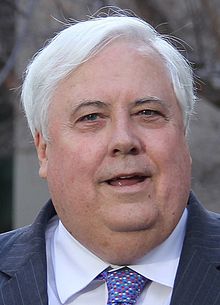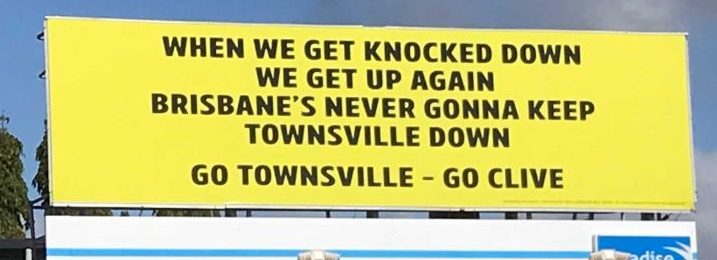Though he hasn’t been quite as ubiquitous as he was in the leadup to the federal election, in the last fortnight Clive Palmer has been in the news for a couple of reasons. One was him claiming that, following his win in court against his former business partners CITIC Pacific, he has the capital to finance his $6.5 million proposed Waratah Coal mine in the Galilee Basin. The mine has for a long time thought to be dependent on infrastructure that would be built for Adani’s controversial Carmichael mine, but Clive is now saying that is not the case. In fact he is talking about building a sludge pipeline to the port, and a coal fired power station near the mine – neither of which are in the original proposal.
The second, more strange and convoluted, story about Mr Palmer in the news is his long awaited court case against government liquidators. This is regarding the $200 million owed to creditors (including $66 million owed to the federal government who paid the wages owed to his employees) following the 2016 collapse of Palmer’s Queensland Nickel refinery in Townsville.

The case has been three years in the making, with numerous delays. To go ahead now it had to survive Palmer seeking to have it adjourned again on the first morning due to an incapacitated witness. But begin it did, a trial expected to last 45 days.
So far, following the case is about as bizarre as following Palmer’s political career, poetic ambitions or dinosaur sculpture collection. Despite the fact he is representing himself, he didn’t even show up to court for the second day on Wednesday, meaning there was no legal representative to hear the accusations of his liquidators.
Presumably this was due less to him sleeping through his alarm clock than it was a reluctance to be present while the court was told of his actions as head of Queensland Nickel. It was alleged that, days before Queensland Nickel was declared insolvent (having lost $15 million in the previous three months), the company bought $135 million of shares in China First – the coal mining company owned wholly by Clive Palmer which had a paid up capital at the time of two dollars. Handily, given the circumstances, the deal included a clause that if QN happened to go into administration, the China First share transaction would be prioritised ahead of payments to employees and suppliers.
Palmer apparently kept the accounts for Queensland Nickel written in pencil in a green notebook. The liquidators allege that somehow, as the sole director, he managed to falsify some entries in the account book. Palmer’s defence is that he was not the company director at all, merely the chairman of a committee that ran the company. The committee was a joint venture of several companies, all owned by Clive Palmer.
Over the years, financial decisions made by the committee included payment of $8 million of company money to Palmer’s father-in-law, a payment made out of “natural love and affection”. His father-in-law later transferred money to Palmer’s nephew Clive Mensink – the nominal director of Queensland Nickel who is currently on a “fugitive from Australia warrant” after skipping the country and failing to attend federal court hearings.
All this could be vaguely funny if not for the fact that all this money was taken from the hands of ordinary people – $66 million in unpaid wages and $200 million all up. While those workers have been struggling to get by, Palmer of course splurged an estimated $60 million on the most expensive political advertising campaign in Australia’s history.

That campaign included one billboard that read “When we get knocked down we get up again/Brisbane’s never gonna keep Townsville down/Go Townsville – go Clive”. Not sure what greenie anarchists Chumbawamba would make of Clive’s appropriation, but it seemed to work on some Townsville residents – 5% of voters in both the city’s electorates gave their first preference to Palmer’s United Australia Party despite the fact that in their city, within the last three years, he laid off 800 workers and stole the $66 million he owed them.
Both these formerly marginal seats were won with big swings to the LNP. Most of the media reported this as Central Queensland’s reaction against southern greenies trying to take away their coal jobs.
The case of Queensland Nickel shows just how shallow the political and media rhetoric of “jobs” is. For big industry, “jobs” is simply a synonym for “profits”. But when the profits aren’t there, they have no loyalty to their workers – as Central Queensland could have learned in 2017 when Peabody shut down the Burton coal mine in a year when the company’s Australian operations made over half a billion dollars profit. That’s even for businesses whose directors aren’t as obviously self-serving as Clive Palmer.
The terrible irony of all this is that the money funneled out of the hands of those who earned it into Clive Palmer’s already bulging pockets is the same money that would potentially finance the Waratah Coal project in the Galilee Basin. With four underground mines, two open cut and a proposed 40 million tonnes of coal per year; the mine would have an immense carbon footprint as well as massive effects on the water table and native habitat.
Mining companies consistently make huge private profits from resources they did nothing to create; receiving generous government subsidies while externalising the environmental costs onto all of us. As a byproduct of this, they employ people to do their work. Never any more than they need to, and never for any longer than is financially viable. But through an extensive propaganda exercise, they push the idea that what they do is of great public benefit. And as it turns out, even in the case of Clive Palmer, people believe this.
The flipside of this message of course is that those who try to stop coal mines from going ahead are the destructive ones. This is the “Brisbane keeping Townsville down” in Clive Palmer’s billboard. Environmentalists make great personal sacrifices and put huge amounts of unpaid work in, not for personal gain but for the common good. The fact that they are the ones demonised by the government and media while the mining industry are presented only as generous job providers reflects the widespread and powerful influence of those who profit off the backs of ordinary people and at the expense of the environment.
The goings on inside the courtroom this week show the reality of how much the mining industry cares for the average worker. If left unchecked, the cost to all of us will be a lot more than millions of dollars in unpaid wages. Our ability to stop those companies from destroying our entire planet for the sake of their own profits will depend on us at some point seeing through the myth of “jobs”.


Recent Comments